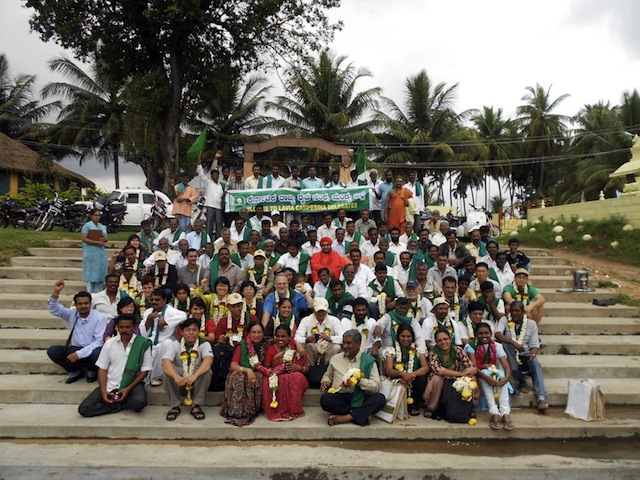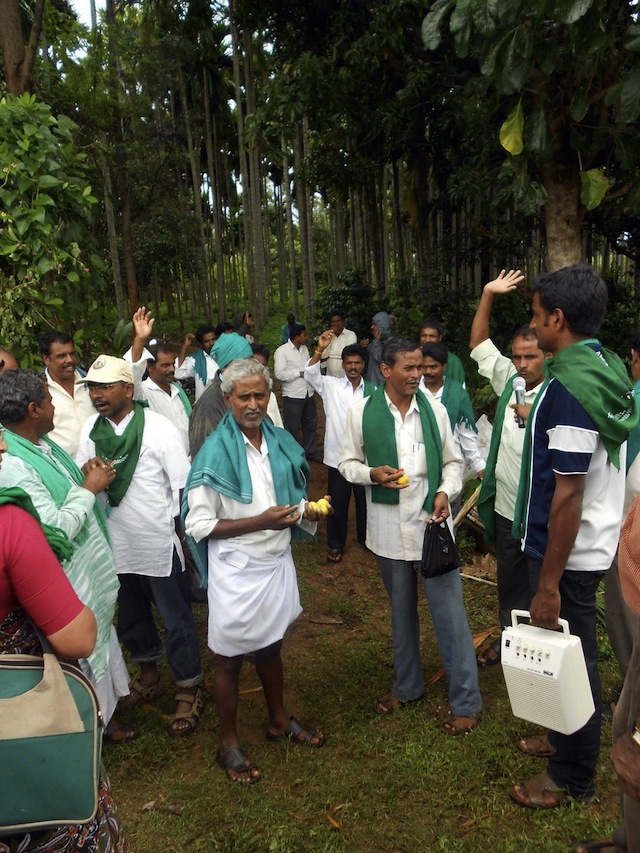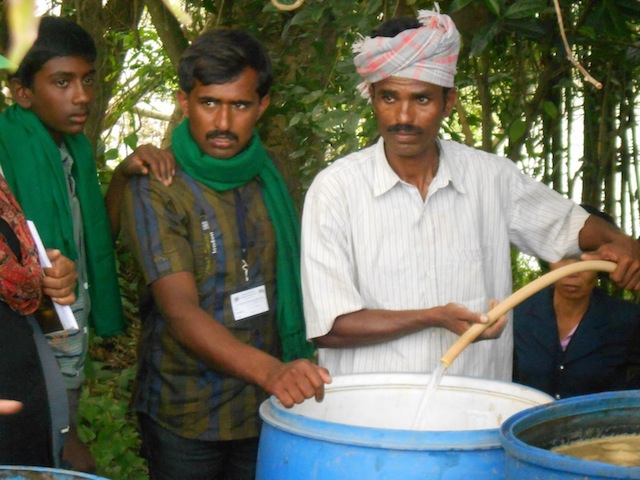Asian farmers visit and learn from Karnataka’s farmers about natural farming


Karnataka: Fifty farmers of La Via Campesina movements from Asia visited some of Karnataka’s most outstanding natural farms from Nov 2 to 6 2011. This event was organized by LVC and KRRS as part of their efforts to carry out farmer to farmer exchanges of knowledge of agro-ecology practices to “feed the world and cool the planet” as well as for farmers movements to share their best knowledge experiences with each other in solidarity.
The international delegation included twenty farmers and social movement activists from Nepal, Sri Lanka, Indonesia, Timor Leste, Cambodia, Vietnam, Thailand, Philippines, South Korea and Mexico. There were also many south Indian farmers present in the delegation.
During the four days journey, the group explored coconut, arecanut and banana farms, as well as vegetable plots, a sericulture field, a paddy seed bank and a jaggery production site. Some farmers were practicing natural farming for more than 15 years, while others had just started. Also a variety of natural farming methods were explored – from Fukuoaka’s method to Palekar’s zero budget natural farming. All farms were situated around the Mysore area, in South Karnataka. They were all successful examples showing that natural farming can and ought to be actively promoted as one of the many sustainable and accessible alternatives to conventional and organic farming. Furthermore, farmers organizations should play a strong role in creating platforms for exchanging practices and knowledge which is one of the best ways of spreading sustainable farming practices.

Natural farming is not a new concept, but a philosophy and practice that can be associated to the earliest stages of agriculture. Indigenous and forest people still treasure the wisdom of the unity of man with nature, but we have lost it in the course of civilization. Industrial organic farming is one attempt to free ourselves from chemicals, but, it is still labour intensive and promotes the addition of foreign organic fertilizers and compost to enhance soil fertility. The main idea of natural farming is that farming should be left to nature itself; it should be simple and low-cost.
The origin of ‘modern’ natural farming is generally associated with the Japanese Masanobu Fukuoka who started his experiments in 1938. Since then, different methods of natural farming have been developed in India. In Karnataka, Subhash Palekar’s Zero Budget Natural Farming (ZBNF) is the most popular method, with hundreds of followers claiming success. The central idea of ZBNF is to end dependence on purchased inputs and monetary investments thereby also ending debt and the cycle of suicides from indebtedness.
Palekar was invited by LVC to Sri Lanka in 2010 for LVC’s Asia level agroecology meeting of farmer trainers. Here, Palekar introduced ZBNF to many Asian farmer trainers involved with agro-ecology practices. Farmers groups in Nepal, Bangladesh and Sri Lanka are now adding elements of ZBNF in ways that are appropriate to their local conditions and finding that it can be adapted and altered to suit their needs.

To close this exchange program, a one-day international seminar on agroecology was held in Mysore on November 6th. In her opening speech, Chukki Nanjundaswamy of KRRS, situated natural farming as a mean of struggle and resistance: “Natural farming is not just about technologies, but it’s also about resisting capitalism”. In the first panel, Peter Rosset of LVC stressed the importance of supporting sustainable and peasant based agricultural practices used all over the world, even though it may have a variety of different names such as agroecology, organic farming, natural farming, biodynamic farming and permaculture. The important thing to remember he said is that these all have similar principles which we in LVC choose to call agroecology. Other panelists included Subhash Palekar, Kailashmurthy, Afsar Jafri and Swami Anand. 200 people, including farmers, students, scientists and the media attended the seminar.
Via Campesina South Asia
